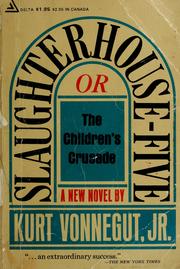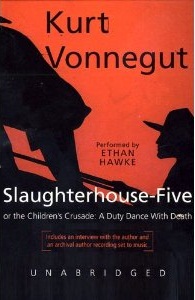
Slaughterhouse-Five, or The Children's Crusade: A Duty-Dance with Death (1969) is a satirical novel by Kurt Vonnegut about World War II experiences and journeys through time of a soldier named Billy Pilgrim. Read 'Slaughterhouse-Five A Novel' by Kurt Vonnegut available from Rakuten Kobo. Kobo BooksKobo eBooksFREE - In Google Play. Hogwarts: An Incomplete and Unreliable Guide ebook by J.K. The Dial Press; ISBN: 069; Language: English; Download options: EPUB 3 (Adobe DRM).
'The best science fiction book ever, definitely the most prescient... Looking at our present trajectory we are on the way to Brave New World' Yuval Noah Harari, author of Sapiens and Homo Deus
‘A masterpiece of speculation... As vibrant, fresh, and somehow shocking as it was when I first read it’ Margaret Atwood
A grave warning... Provoking, stimulating, shocking and dazzling' Observer
'What Aldous Huxley presented as fiction with the human hatcheries of Brave New World has become fact. The consequences are profound and, if we don't get it right, deeply disturbing' John Humphries, Sunday Times

WITH INTRODUCTIONS BY MARGARET ATWOOD AND DAVID BRADSHAW
Far in the future, the World Controllers have created the ideal society. Through clever use of genetic engineering, brainwashing and recreational sex and drugs all its members are happy consumers. Bernard Marx seems alone harbouring an ill-defined longing to break free. A visit to one of the few remaining Savage Reservations where the old, imperfect life still continues, may be the cure for his distress...
Slaughterhouse Five Ebook Download Free Game
Huxley's ingenious fantasy of the future sheds a blazing light on the present and is considered to be his most enduring masterpiece.
Author : Kurt Vonnegut
ISBN : 9780440339069
Genre : Fiction
File Size : 77.97 MB
Format : PDF, Mobi
Download : 570
Read : 424
Slaughterhouse Five Ebook Download Free Pc
A special fiftieth anniversary edition of Kurt Vonnegut’s masterpiece, “a desperate, painfully honest attempt to confront the monstrous crimes of the twentieth century” (Time), featuring a new introduction by Kevin Powers, author of the National Book Award finalist The Yellow Birds Selected by the Modern Library as one of the 100 best novels of all time Slaughterhouse-Five, an American classic, is one of the world’s great antiwar books. Centering on the infamous World War II firebombing of Dresden, the novel is the result of what Kurt Vonnegut described as a twenty-three-year struggle to write a book about what he had witnessed as an American prisoner of war. It combines historical fiction, science fiction, autobiography, and satire in an account of the life of Billy Pilgrim, a barber’s son turned draftee turned optometrist turned alien abductee. As Vonnegut had, Billy experiences the destruction of Dresden as a POW. Unlike Vonnegut, he experiences time travel, or coming “unstuck in time.” An instant bestseller, Slaughterhouse-Five made Kurt Vonnegut a cult hero in American literature, a reputation that only strengthened over time, despite his being banned and censored by some libraries and schools for content and language. But it was precisely those elements of Vonnegut’s writing—the political edginess, the genre-bending inventiveness, the frank violence, the transgressive wit—that have inspired generations of readers not just to look differently at the world around them but to find the confidence to say something about it. Authors as wide-ranging as Norman Mailer, John Irving, Michael Crichton, Tim O’Brien, Margaret Atwood, Elizabeth Strout, David Sedaris, Jennifer Egan, and J. K. Rowling have all found inspiration in Vonnegut’s words. Jonathan Safran Foer has described Vonnegut as “the kind of writer who made people—young people especially—want to write.” George Saunders has declared Vonnegut to be “the great, urgent, passionate American writer of our century, who offers us . . . a model of the kind of compassionate thinking that might yet save us from ourselves.” Fifty years after its initial publication at the height of the Vietnam War, Vonnegut's portrayal of political disillusionment, PTSD, and postwar anxiety feels as relevant, darkly humorous, and profoundly affecting as ever, an enduring beacon through our own era’s uncertainties. “Poignant and hilarious, threaded with compassion and, behind everything, the cataract of a thundering moral statement.”—The Boston Globe

